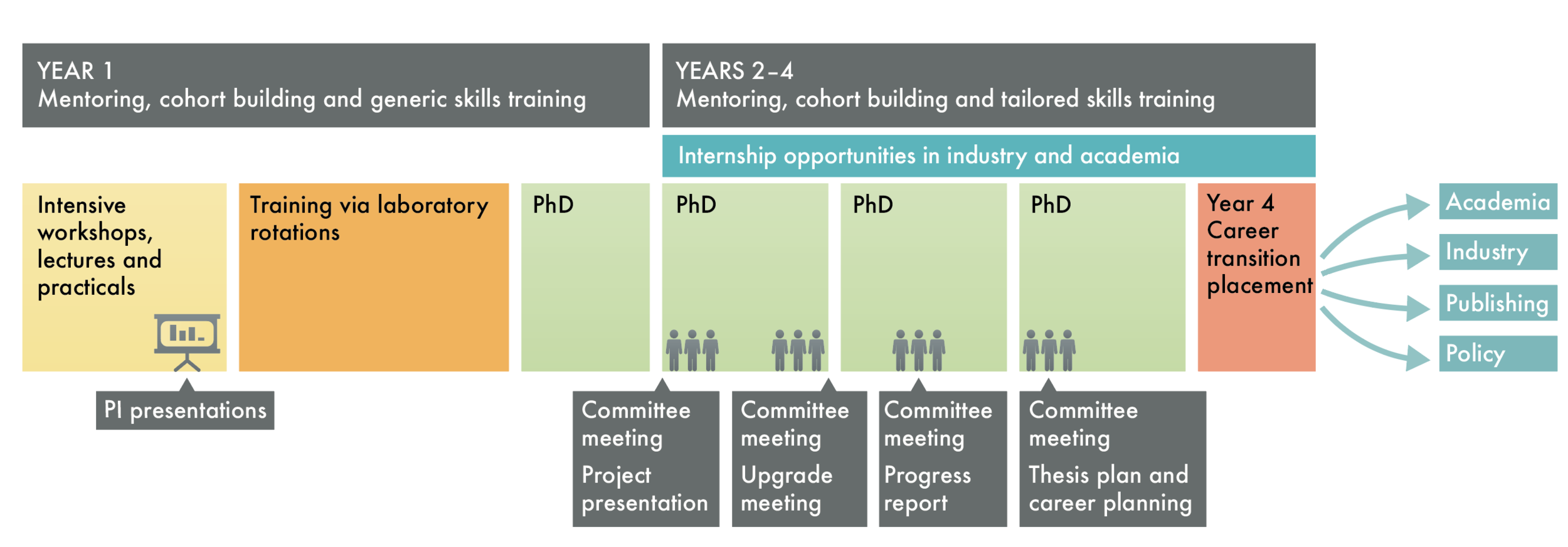4-year programme structure
Programme structure
Year 1
The First Three Months. Students are introduced to the core concepts and basic practical skills required for optical biology.
Optical training (lectures, workshops and practicals) includes:
optical theory
confocal microscopy, 2-photon and 3-photon microscopy, light sheet microscopy
super-resolution imaging (including appropriate fluorophores and genetically encoded probes)
TIRF
optical tweezers
adaptive optics
1-photon and 2-photon optogenetics (including optogenetic probes)
fluorescent reporters and fluorophores (excited state spectroscopy)
photolysis
strategies for developing new photochemical ligands to probe biological structures
construction of a light sheet microscope
Analysis training includes:
MatLab and Python programming
quantitative analysis methods
application of advanced statistical methods including machine learning techniques
The training in optical techniques and analysis methods will be complemented by research talks showcasing applications of optical techniques to biological problems.
Rotation projects. In January of Year 1, students begin a minimum of two and a maximum of four short (6-8 week) rotation projects in laboratories of their choice. After a minimum of two rotations, students can decide on a project/laboratory for their PhD work.
Professional and Transferable Skills Training. Professional and transferable skills training is embedded in Year 1 and emphasizes effective written, oral and multimedia communication, as well as data analysis skills.
PhD host lab selection. Following laboratory rotations students will choose a host laboratory for their PhD work. Each student will be assigned a PhD committee consisting of three members of the programme, for the duration of the PhD.
Committee Meeting 1. In May – June of Year 1, each student provides a short, written PhD proposal and presents a 15-minute talk to the committee outlining their proposed project. The committee provides feedback on the plan and identifies any additional training needs.
Years 2-4 | Structured Mentorship and specialist training
During years 2-4, students meet with their committees on an annual basis. Additionally, they may approach the director, co-directors, programme tutor or student mentor at any time for confidential advice or to express concerns. Students may also undertake 3-month internships in industry or academia.
Committee Meeting 2 (second year). MPhil to PhD upgrade meeting. In August of Year 2, students meet with their management committee to discuss progress with their project, as well as identifying further skills training.
Committee Meeting 3 (third year). March of Year 3. Review of progress and training needs, and initial discussion of post-PhD career plans.
Committee Meeting 4 (Final year). December of Year 4. Discussion of thesis content and plans for thesis completion in September. Detailed discussion of post-PhD career plan.
At the end of Year 4, students can participate in fully-funded career-transition placements in industry or academia.
Additional training
Students have access to additional training:
Provided by other graduate programmes (e.g. ‘Research techniques for cell biology’ and ‘Microfabriction and micropatterning’)
Via reciprocal training agreements (e.g. MRC Cell Biology, MRC DTP, Cambridge-UCL Connected Electronic and Photonic Systems (CEPS) CDT, and the Institute for the Physics of Living Systems (IPLS))
Via the UCL Doctoral School (e.g. Writing Skills, Advanced Programming in MATLAB, Research Programming with Python)
Advanced machine learning courses (e.g. deep learning (taught exclusively at UCL in collaboration with DeepMind), internships at the National Data Science (Turing) Institute)
